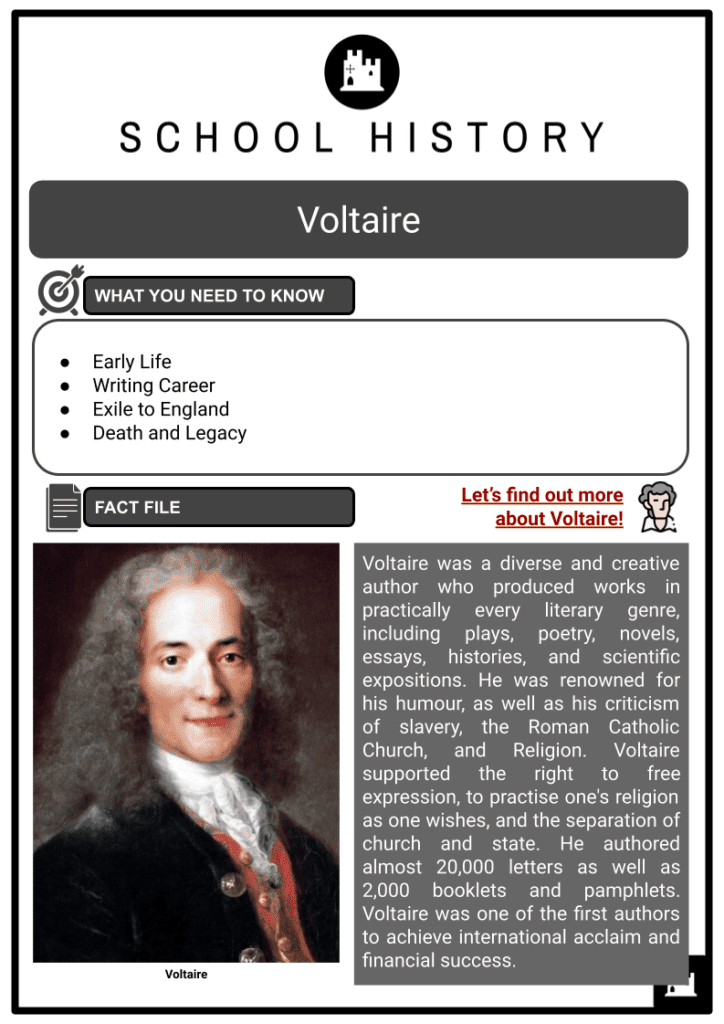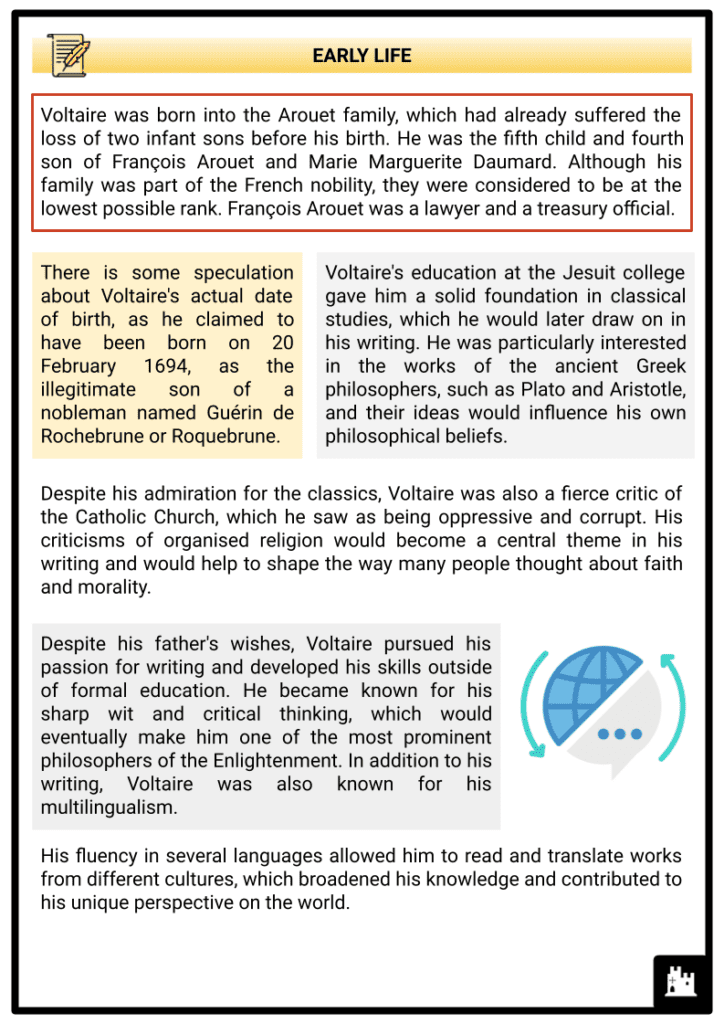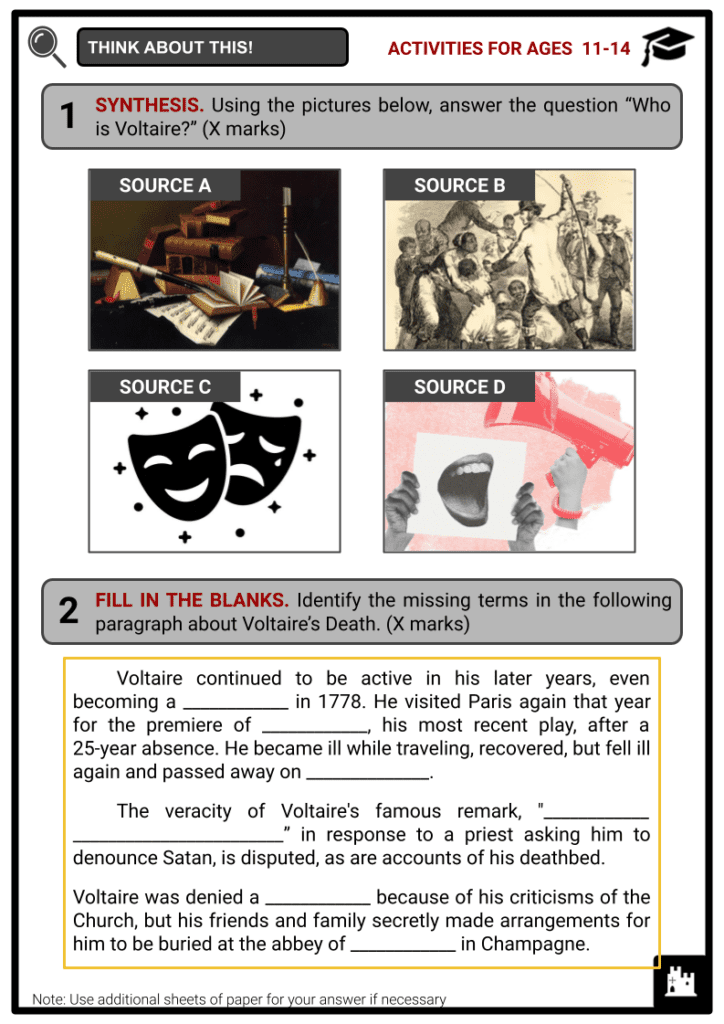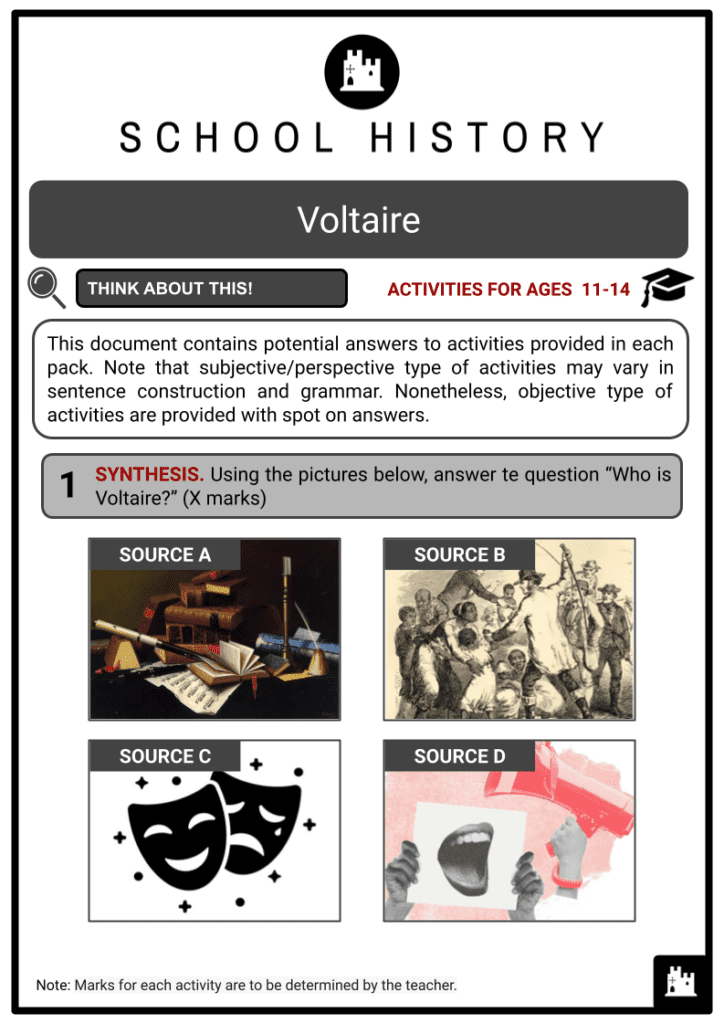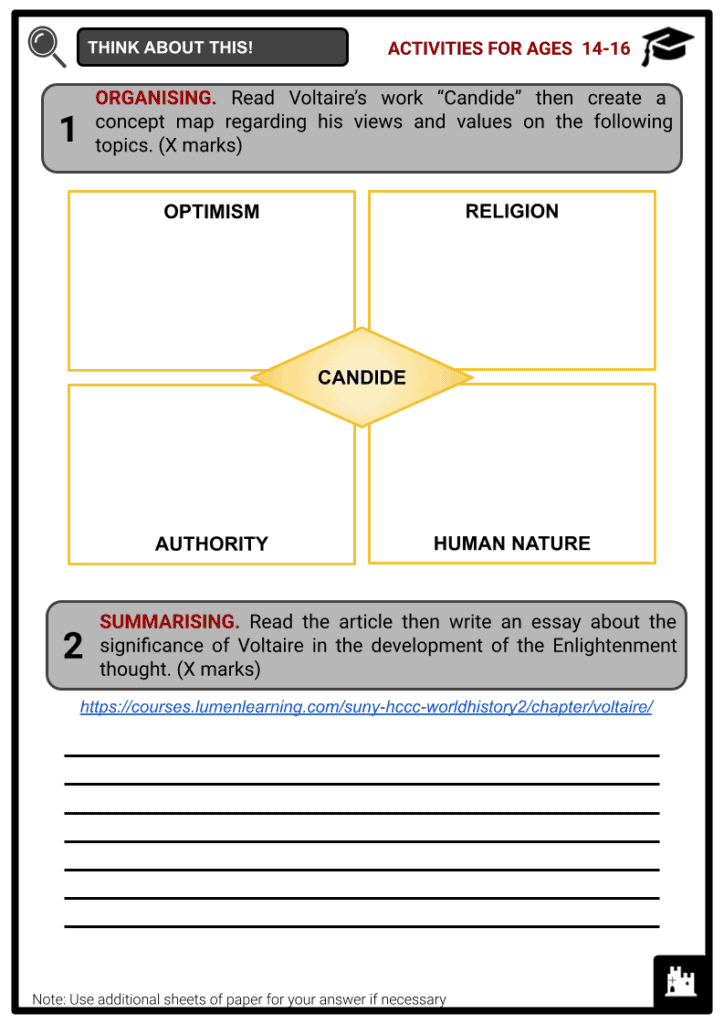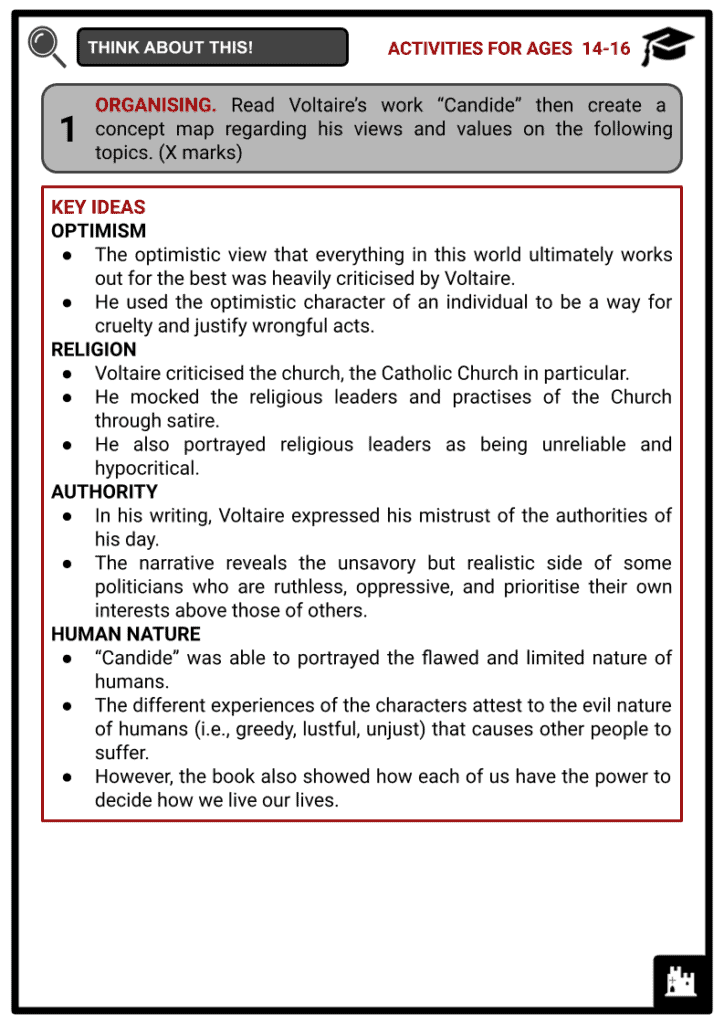Voltaire Worksheets
Do you want to save dozens of hours in time? Get your evenings and weekends back? Be able to teach about Voltaire to your students?
Our worksheet bundle includes a fact file and printable worksheets and student activities. Perfect for both the classroom and homeschooling!
Summary
- Early Life
- Writing Career
- Exile to England
- Death and Legacy
Key Facts And Information
Let's find out more about Voltaire!
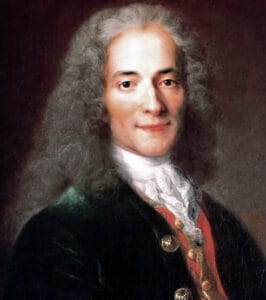
Voltaire was a diverse and creative author who produced works in practically every literary genre, including plays, poetry, novels, essays, histories, and scientific expositions. He was renowned for his humour, as well as his criticism of slavery, the Roman Catholic Church, and Religion. Voltaire supported the right to free expression, to practise one's religion as one wishes, and the separation of church and state. He authored almost 20,000 letters as well as 2,000 booklets and pamphlets. Voltaire was one of the first authors to achieve international acclaim and financial success.
EARLY LIFE
- Voltaire was born into the Arouet family, which had already suffered the loss of two infant sons before his birth. He was the fifth child and fourth son of François Arouet and Marie Marguerite Daumard. Although his family was part of the French nobility, they were considered to be at the lowest possible rank. François Arouet was a lawyer and a treasury official.
- There is some speculation about Voltaire's actual date of birth, as he claimed to have been born on 20 February 1694, as the illegitimate son of a nobleman named Guérin de Rochebrune or Roquebrune.
- Voltaire's education at the Jesuit college gave him a solid foundation in classical studies, which he would later draw on in his writing. He was particularly interested in the works of the ancient Greek philosophers, such as Plato and Aristotle, and their ideas would influence his own philosophical beliefs.
- Despite his admiration for the classics, Voltaire was also a fierce critic of the Catholic Church, which he saw as being oppressive and corrupt. His criticisms of organised religion would become a central theme in his writing and would help to shape the way many people thought about faith and morality.
- Despite his father's wishes, Voltaire pursued his passion for writing and developed his skills outside of formal education. He became known for his sharp wit and critical thinking, which would eventually make him one of the most prominent philosophers of the Enlightenment. In addition to his writing, Voltaire was also known for his multilingualism.
- His fluency in several languages allowed him to read and translate works from different cultures, which broadened his knowledge and contributed to his unique perspective on the world.
WRITING CAREER
- Upon leaving school, Voltaire relocated to Paris where he began his pursuit of becoming a writer. In an attempt to appease his father's wishes for him to pursue a career in law, Voltaire claimed to be working as an assistant to a notary. However, it soon became clear that his true passion was writing poetry. When his father eventually found out, he was unhappy with Voltaire's lack of focus and promptly sent him away to study law in Caen, Normandy.
- Despite the setback, Voltaire refused to abandon his writing ambitions. He shifted his focus from poetry to historical studies and essays, which allowed him to continue developing his writing skills. It was during this time that he began to cultivate the sharp, witty writing style for which he would later become known for. His unique writing style caught the attention of many high-ranking nobles, who were impressed by his intellectual prowess and entertaining conversation.
- In 1713, Voltaire's father helped him secure a position as a secretary to the French ambassador in the Netherlands.
- It was during his time in The Hague that Voltaire had his first romantic experience, falling in love with a Huguenot refugee named Catherine Olympe Dunoyer.
- Unfortunately, their relationship was considered inappropriate and scandalous, which forced the ambassador to demand that Voltaire end it and return to France.
- After his time in Caen, Voltaire returned to Paris and began his writing career. However, his choice of topics didn't exactly endear him to the authorities.
- Voltaire was fond of satirising political figures and critiquing the government, and these activities landed him in trouble early on. One such incident occurred when he wrote a satire accusing the Duke of Orleans of incest.
- As a result, Voltaire was imprisoned in the Bastille for nearly a year. Nonetheless, upon his release, his debut play based on the Oedipus myth was staged and received both critical and commercial success.
- Even the Duke of Orleans, whom he had previously lampooned, presented him with a medal to honor the achievement.
- François-Marie Arouet soon began using the pen name Voltaire, under which he would publish most of his works. The origins of this name remain the subject of debate, but some belief it to be an anagram or pun on his family name or a combination of different nicknames. Voltaire purportedly adopted the name in 1718, after his release from the Bastille. Around this time, he also began a new romantic relationship with Marie-Marguerite de Rupelmonde, a young widow.
- Despite the success of his first play, Voltaire's subsequent works didn't fare as well. His play ‘Artémire’ failed so badly that only a few fragments of the text survive today. He failed to get a publisher in France when he tried to release an epic poem on King Henry IV. As a result, he travelled to the Netherlands with Rupelmonde and found a publisher in The Hague. In the end, Voltaire succeeded in persuading a French publisher to covertly release the poem, ‘La Henriade’. Both the poem and his subsequent drama, which was presented at Louis XV's wedding, were well received.
- In 1726, Voltaire became involved in a feud with a young nobleman who insulted his use of the name Voltaire. Voltaire challenged the nobleman to a duel, but instead, the nobleman had him beaten and arrested without a trial. However, Voltaire was able to negotiate his exile to England instead of imprisonment in the Bastille.
EXILE TO ENGLAND
- Upon his exile to England, Voltaire found himself among the leading intellectuals of English society, including Jonathan Swift and Alexander Pope. This experience had a profound effect on Voltaire, especially in his thinking about government, religion, and freedom of speech. He observed that England was a constitutional monarchy with greater freedoms than the absolute monarchy of France. The experience in England shaped his criticisms and writings for the rest of his life.
- Voltaire returned to France, though still banned from the court at Versailles. Despite this, he became incredibly wealthy through participation in a lottery plan and an inheritance from his father.
- In the early 1730s, Voltaire published works that showed his clear English influences.
- For instance, his play ‘Zaïre’ was dedicated to his English friend Everard Fawkener and praised English culture and freedoms.
- He also published a collection of essays in 1733, called the ‘Letters Concerning the English Nation’.
- However, this book landed him in trouble once again when it was published in French the next year without the approval of the official royal censor.
- The essays praised British religious freedom and human rights, leading to the book's banning and Voltaire's fleeing from Paris.
- This is when Voltaire first encountered Émilie, the Marquise du Châtelet, who would go on to be his most important love interest. Despite being married and a mother, she was a mathematician and Voltaire's intellectual equal. They spent hours researching and conducting experiments together, many of which were motivated by Voltaire's passion for Sir Isaac Newton, and acquired a common archive of nearly 20,000 books. Voltaire retreated to her husband's estate during the Letters Scandal, where they carried on their relationship for 16 years.
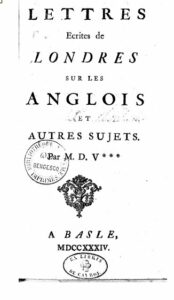
Letters Concerning the English Nation - Voltaire decided to keep a lower profile following his several disputes with the government, but he continued to write, now focusing on history and science. With him, the Marquise du Châtelet made a significant contribution by translating Newton's ‘Principia’ into French definitively and by reviewing Voltaire's Newton-based works. They were crucial in bringing Newton's ideas to France.
- They also developed critical views on religion, with Voltaire publishing several texts that sharply criticised state religions, religious intolerance, and even organised religion as a whole. Similarly, he criticised the style of histories and biographies of the past, suggesting they needed a more scientific and evidence-based approach to research.
- Voltaire’s friendship with Frederick the Great, the future King of Prussia, began in the 1730s when Frederick was still just the crown prince. The two corresponded regularly until they finally met in person in 1740. Despite their friendship, Voltaire still acted as a French spy when he went to Frederick's court in 1743, where he reported back on Frederick’s intentions and capabilities regarding the ongoing War of Austrian Succession.
- By the mid-1740s, Voltaire’s affair with the Marquise du Châtelet had started to wane. Tired of spending all his time at her estate, they both found new companionship. In Voltaire’s case, it was even more scandalous than their previous affair: he became involved with his own niece, Marie Louise Mignot, whom he later lived with. In 1749, the Marquise died in childbirth, and the following year, Voltaire moved to Prussia.
- In the 1750s, Voltaire's relationships with Prussia began to sour. He was accused of theft and forgery related to some bond investments, which led to a feud with the president of the Berlin Academy of Sciences. The dispute culminated in Voltaire writing a satire that offended Frederick the Great and temporarily destroyed their friendship. However, they would eventually reconcile in the 1760s.
DEATH AND LEGACY
- After being forbidden by King Louis XV to return to Paris, Voltaire made his way to Geneva in 1755 where he continued to publish. His most famous work, ‘Candide’, or ‘Optimism’, a satirical novel that criticised the philosophy of optimistic determinism put forth by philosopher Leibniz, was published during this time.
- Voltaire was a champion of the rights of unjustly persecuted individuals, particularly those who suffered religious persecution. One of his most notable causes was the case of Jean Calas, a Huguenot who was falsely accused of murdering his son for wanting to convert to Catholicism. Calas was subjected to torture and his property was confiscated while his daughters were forced into Catholic convents. Voltaire, along with others, believed that Calas was the victim of religious persecution and worked tirelessly to overturn his conviction, which was ultimately successful in 1765.
- In his last years, Voltaire remained active, even being initiated into Freemasonry in 1778. Some historians suggest that Benjamin Franklin may have urged him to join.
- In the same year, he returned to Paris after a 25-year absence to see his latest play, ‘Irene’, open. Although he fell ill on the journey, he recovered soon after. However, two months later, he became ill again and died on 30 May 1778.
- Accounts of Voltaire's deathbed vary depending on the source, and the veracity of his famous quote, "Now is not the time for making new enemies!" in response to a priest asking him to renounce Satan, is disputed.
- Due to his criticisms of the Church, Voltaire was denied a Christian burial, but his friends and family secretly arranged for him to be buried at the abbey of Scellières in Champagne.
- Voltaire's legacy is complex, and while he championed religious tolerance and anti-enslavement and anti-monarchical views, he also espoused anti-Semitic views, contributing to Enlightenment-era anti-Semitism. He also disdained the idea of democracy. Nonetheless, Voltaire's texts have become a key component of Enlightenment thinking, ensuring his philosophy and writing have endured for centuries.

